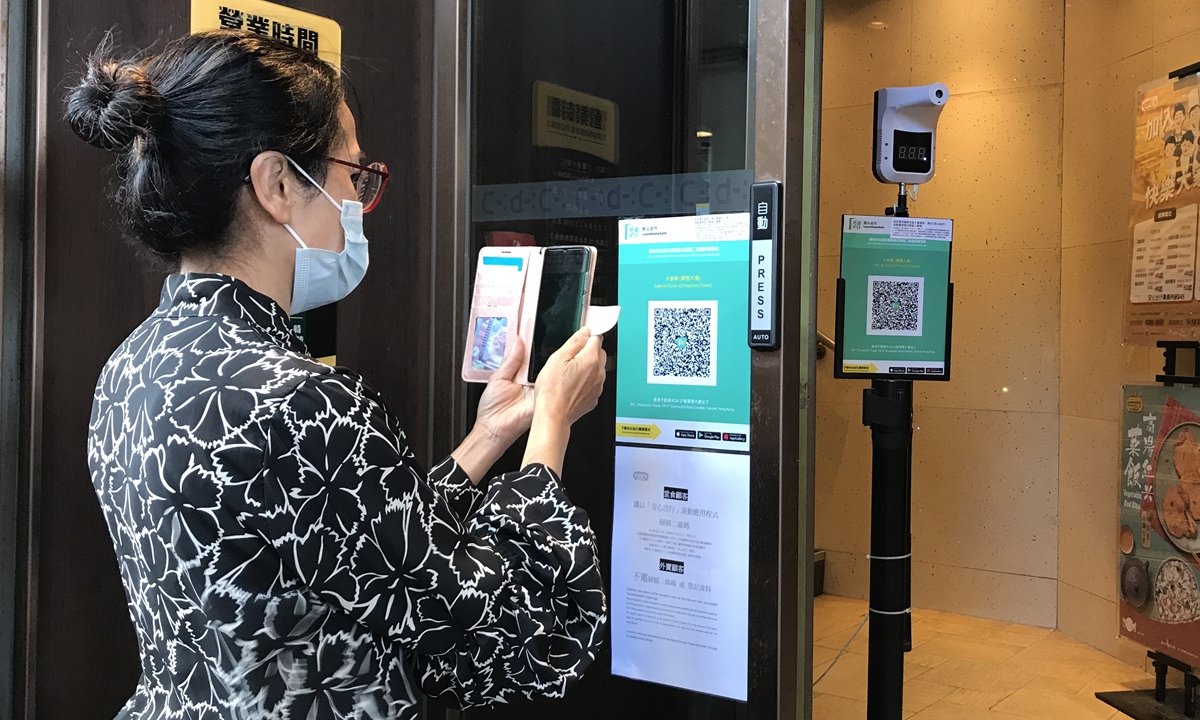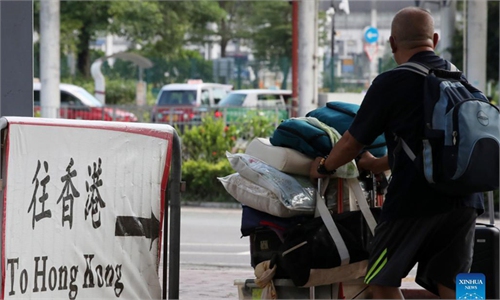HK businessmen gear up for widely anticipated border reopening with mainland
Quarantine-free travel to mainland would boost businesses: entrepreneurs

A Hong Kong resident scans a health code on December 10, 2021. Photo: VCG
Entrepreneurs in the Hong Kong Special Administrative Region (HKSAR) are accelerating registration for the city's version of a health code ahead of the widely anticipated border reopening with the Chinese mainland, as they express confidence that quarantine-free travel would help boost their businesses in the mainland after disruptions posed by the COVID-19 pandemic.More than 336,000 people had registered for the Hong Kong Health Code as of Sunday at noon, after registration was opened on Friday, China Media Group (CMG) reported, rekindling hope among cross-border businesspeople who have long waited for normalized travel between the HKSAR and the mainland.
Ken Wong, director of All Times Healthy Co in the HKSAR, was among the first applicants for the health code.
"My employee and I have applied for the health code. We hope that the border reopening can be given a trial with quotas by the end of December and fully restored by the end of June next year," Wong told the Global Times on Monday.
With close business ties to the mainland market, Wong usually travels a lot between the HKSAR and the mainland. He has just finished a two-month trip to the mainland to attend the fourth China International Import Expo (CIIE) held in Shanghai in November.
"As trade with the mainland becomes more and more frequent, we need to visit lawyers' offices and banks in the mainland often to sign documents. Before the coronavirus outbreak, all these processes were convenient and only took one day," he said.
Frank Lao, managing director at Galaxy Payroll group, a Hong Kong-based outsourcing service provider, said that the company is also ready for the border reopening.
"It is great news for us that the mainland will resume quarantine-free travel with Hong Kong in the near future. We have asked colleagues to get vaccinated as soon as possible. We all registered for the Hong Kong health code and informed our mainland clients about the possibility of face-to-face meetings in the future," Lao told the Global Times on Monday.
The Hong Kong health code was launched on Friday to pave the way for the border reopening between the Chinese mainland and Hong Kong.
Upon successful registration, applicants need to upload their travel records for the previous 31 days to get the code, according to a notice published on the website of the HKSAR government.
Like the one in the mainland, the Hong Kong health code is divided into red, amber and green and the standard to determine the color of the code aligns with that of the "YueKang Code" issued by South China's Guangdong Province, the notice said.
Hong Kong Chief Executive Carrie Lam said at a press conference on December 7 that there would be a quota system at the beginning of customs clearance to gradually proceed with the border reopening, with priority given to government staff and businesspeople with an urgent need to visit the mainland, CMG reported.
At present, the only two open borders between the mainland and Hong Kong are the Shenzhen Bay Port and the Hong Kong Port of the Hong Kong-Zhuhai-Macao Bridge, which together allow a maximum of 1,000 people daily to pass through, while the rest of the borders remain closed, mainland news outlet Jiemian reported.
Travelers entering the mainland from the HKSAR need to undergo 14 days of quarantined medical observation and seven days of health monitoring at home; mainlanders entering Hong Kong are subject to 14 days of compulsory quarantine.
"The mainland is an important market for us. We used to travel to and from the mainland very frequently. However, during the epidemic, business activities were seriously disrupted due to the closure of border checkpoints between Hong Kong and the mainland," Lao said.
According to Lao, the coronavirus has hit the services sector in Hong Kong hard, and many companies like his are looking forward to the border reopening to get connected to the mainland market, which has become a pillar of economic growth.
"We used to help foreign companies recruit in the mainland but now our main business focuses on helping mainland companies develop overseas markets. As the mainland economy gradually recovers and such demand grows, we see great potential in the mainland market," Lao said.



